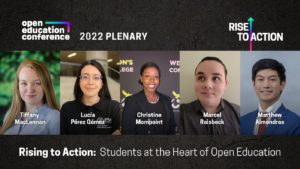The progress achieved to date in the open education movement is thanks, in large part, to the work of students.
What does it take to be an effective advocate?
Campus leaders say it requires dedication, creativity, and tenacity to advance the open agenda and help institutions think in new ways about affordable, tailored learning materials.
Students from a variety of institutions from community colleges to large research universities are committed to expanding the use of open educational resources. Many say it’s challenging because they are trying to change the system. Advocates have built resilience coming together to share what has and hasn’t worked and forming communities of support.
Lucía Pérez Gómez, a medical student based in Madrid, Spain, said she’s motivated to act because openness across all published research outputs is necessary to reach health inequities and advance health outcomes. She serves as a liaison officer for medical sciences and research issues for the International Federation of Medical Students Associations, which represents more than 1 million medical students worldwide.
“As medical students, we are constantly exposed to non-open educational resources, and this is something that makes science less available and transparent,” Gomez said. “Open science has been proven to improve the educational experience, democratize access to research and education, accelerate research outputs, and improve the visibility and impact of scholarship.”
 Gomez’s efforts have focused on building awareness through peer education. The federation campaigns are in conjunction with International Open Access Week and the Open Education Conference – both opportunities to leverage resources and communities working together to advance open policies.
Gomez’s efforts have focused on building awareness through peer education. The federation campaigns are in conjunction with International Open Access Week and the Open Education Conference – both opportunities to leverage resources and communities working together to advance open policies.
Working in a campus bookstore at Houston Community College in Texas, Christine Mompoint says she saw students’ shock at the cost of textbooks. Many were struggling single parents and international students. She discovered OER through a psychology class that used an OpenStax textbook and wanted to help other students advocate for affordable options.
“The biggest need right now is to simplify and make things easy and accessible for students,” Mompoint said. “Being a student advocate today is difficult and it can be lonely. It’s about putting yourself out there and putting yourself on the line. We’re going against the system that is meant to be for students, but it’s not.”
At community colleges, a lot of decisions are made without student voice, Mompoint said. With OER, it takes time. She said she feels responsible for passing the torch to the next round of student advocates, but that opportunity is not always possible.
Continuity with advocacy can be difficult, as student tenure in leadership positions is limited, said Tiffany MacLennan, a recent graduate and current research analyst with Higher Education Strategy Associates. “Students have a role for a year, and they do their best to pass on their knowledge to someone else,” McLennan said. “They hope that their priorities line up, but that doesn’t always happen.”
Sometimes administrators can “wait a student leader out” and not advance OER, McLennan said. To expand open education, she suggested it’s important to build knowledge about OER across campus in a way that is sustainable.
While affordability and accessibility are the main benefits of OER, the materials also are often more engaging for students, said MacLennan. In her work, she discovered faculty often had no idea how much their students actually struggled financially until they started introducing open educational resources into their classrooms.
It’s important to get student input about publisher claims, as institutions consider automatic textbook billing (“inclusive access”), MacLennan said. In her college experience, students recommended against the model after a pilot — something the institution didn’t like — yet in the end, it did not adopt a full contract to inclusive access.
At the University of Illinois Chicago, more than half of students are considered low-income so OER is critical to helping many manage the cost of college, said Matthew Almedras, a public health major who is president of the Undergraduate Student Government where he advocates for open education. OER has the added benefit of allowing professors to tailor materials to better fit their student’s needs and be updated — as was the case during the pandemic when textbooks could be revised with the latest on COVID-19.
“I believe the internet was made to share knowledge for free and make knowledge more accessible to everyone,” Almedras said. “OER removes barriers.”
At the University of Amherst, Marcel Raisbeck is working to promote accessibility in open education for students, especially for those with disabilities and those who are underrepresented. In open spaces, he said students and professors are motivated to work together to co-create and have an impact on future educational materials.
It can be rewarding to build communities and work for change, but Raisbeck said it’s a perpetual uphill battle. Institutions are producing knowledge and should work in the best interest of students. Raisbeck said, rather than deferring to publishers.
“Open education juxtaposes the profit motives that have become more a thing in higher educational institutions,” he said. “They’re serving their students. They care about higher educational attainment, but also they are running businesses — and being able to connect with publishers is one avenue of revenue.”
Students can make an impact on OER, when they find support and community, McLennan added.
“Students are really willing to take great agency over their education when they are given the ability to do so,” she said. “If you give people the resources they need, they will do incredible, amazing, fantastic things — but we have to help build that knowledge.”
[To listen to the complete conversation with student advocates at the 2022 Open Education Conference, click here]